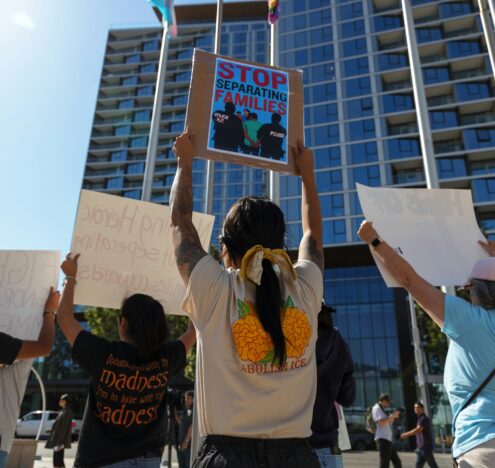In recent years, Republicans and rightwing activist groups have trained their sights on one of their most formidable enemies to date: books. From Texas to Florida, titles on gender, sexuality, race, migration, and even war, among other issues, have filled the ever-growing lists of banned books.
Book ban proponents routinely argue that they have targeted “obscene,” “anti-American,” or racially divisive literature. But in “Cover to Cover,” a recent report, PEN America conducted a comprehensive analysis of the thousands of titles on such banned book lists around the United States.
According to PEN America’s tally, schools around the nation banned more than 10,000 books and removed more than 4,200 unique titles from the shelves throughout the 2023-2024 school year.
Despite the uproar over supposedly sexual content, PEN America found that just 13% of the banned titles included sexual descriptions “on the page,” while fewer than a third had “off the page” sexual descriptions.
“Sex-related content is one of the most commonly discussed and criticized subjects in books in school libraries today,” the report pointed out. “The two states with the most school book bans last year–Florida and Iowa–both have legislation that, in part, targets books that include sex-related content.”
But if the most-cited talking point on book removals doesn’t actually apply to the majority of the banned titles, then what kinds of books are schools actually removing?
Well, well. In PEN America’s telling, more than a third of the books include a person of color or people of color as primary characters, while a quarter tell the stories of LGBTQ+ characters. Another 10% targeted books with neurodivergent or disabled characters.
*
According to one count, children of color accounted for half of the country’s child population in 2021. “These school book bans are, quite literally, removing the literature that represents the lives of more than half of young people in the United States,” PEN America explained. “This erasure in school libraries has deeply harmful impacts on the mental health of students of color.”
PEN took its breakdown further. Some 85% of banned titles were fiction, for instance, while books that deal with “nonsexual violence” made up 60%. Nearly a quarter of those were books that contained “violence within warfare.”
Of all the banned titles, around a fifth explore LGBTQ+ themes, another fifth look at race and racism, 15% cover political activism, and seven percent touch on refugee issues or immigration.
Back in January, President Donald Trump signed an executive order his administration called “Ending Radical Indoctrination in K-12 Schooling.” In recent years, that order claimed, “parents have witnessed schools indoctrinate their children in radical, anti-American ideologies while deliberately blocking parental oversight.”
For its part, though, PEN America explained that book banning is “the result of a well-funded campaign to dismantle public education.” Behind that drive is “a coordinated network of groups that largely espouse white supremacist and Christian nationalist ideology,” the watchdog said.
Grim as it is, the group ultimately signaled a belief that book bans would backfire. “Hope can be found in the increasingly brave and growing movement to defend libraries from book bans,” the report noted. “People from all walks of life are standing together to protect libraries from those who seek to empty them.”




















